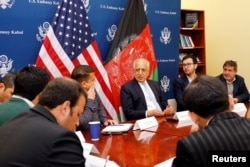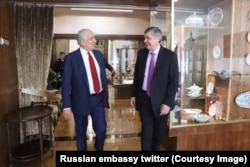The Afghan Taliban says it will resume negotiations Monday with the United States in Qatar, insisting the meeting "will prove positive" despite recent hiccups and propaganda against the peace process.
Washington has engaged the insurgent group in direct talks since last fall in a bid to promote a political settlement to the war in Afghanistan.
The last meeting took place nearly a month ago when both sides reported to have agreed "in principle" to a framework for a deal on the American troop withdrawal conditioned only on Taliban guarantees that terrorists would not be allowed to use Afghan territory for future attacks against U.S. and its allies.
It also was agreed upon at the time that both sides would form working groups to flesh out details and prepare recommendations before the next meeting.
"A meeting will take place between the negotiation team of [the] Islamic Emirate (Taliban) and U.S. representatives in Qatar and Allah [God] willing, it will prove positive," a Taliban spokesman announced Friday.
Zabiullah Mujahid rejected as propaganda media reports that the newly appointed chief of Taliban's Qatar-based political office, Abdul Ghani Akhund, commonly known as Mullah Baradar, would not join Monday's meeting with Americans due to internal disagreements.
Mujahid explained that Mullah Baradar has done his part by appointing a team of Taliban negotiators and authorizing them to carry out talks with U.S. interlocutors. He emphasized that Baradar is "the deputy of the Islamic Emirate [Taliban] in political affairs and there was an absence of his peer in the U.S. team hence no need was seen" for participation in the upcoming meeting.
Afghan-born special reconciliation representative, Zalmay Khalilzad, is leading the U.S. team in talks with the Taliban. He has repeatedly stated in recent days that a Taliban cease-fire and engagement with the Afghan government in peace dialogue are key to achieving progress in the talks.
The Taliban refuses to engage in any dialogue process with Kabul unless all foreign troops leave Afghanistan.
Khalilzad is currently visiting Afghanistan and regional countries to shore up support for the peace process. On Friday, he visited Turkey where he met with Russian presidential envoy for Afghanistan, Zamir Kabulov to discuss the peace efforts.
Talks with Russia
The Russian Embassy in Ankara said in a brief announcement via Twitter that it hosted the meeting, but gave no further details. Moscow also has stepped up diplomatic efforts to push for a negotiated end to the Afghan conflict, insisting continued regional instability would threaten Central Asian allies and Russian security interests.
Additionally, Khalilzad used Twitter to confirm talks with the Russian envoy.
"Just met my Russian counterpart Ambassador Kabulov. We agreed that all-inclusive intra-Afghan dialogue is essential to advance peace efforts. To move forward, Afghans should name a unified, inclusive and national negotiating team that includes the Afghan government and other Afghans," the U.S. envoy said.
Khalilzad said travel restrictions on Taliban negotiators also came under discussions with Kabulov. "We will explore options for securing U.N. travel waivers for Taliban negotiators to participate in peace talks," he added.
The insurgent group had announced earlier this month that prior to the Qatar interaction, Taliban negotiators would travel to Pakistan for talks with Khalilzad on Feb. 18 and meet separately with the Pakistani prime minister during their stay in Islamabad. But the Taliban subsequently said the visit could not take place because of U.S. and U.N. travel sanctions on most members of its negotiations team.
The Taliban demanded removal of the travel restrictions, describing them as a "major hurdle" in the way of the Afghan peace process.






